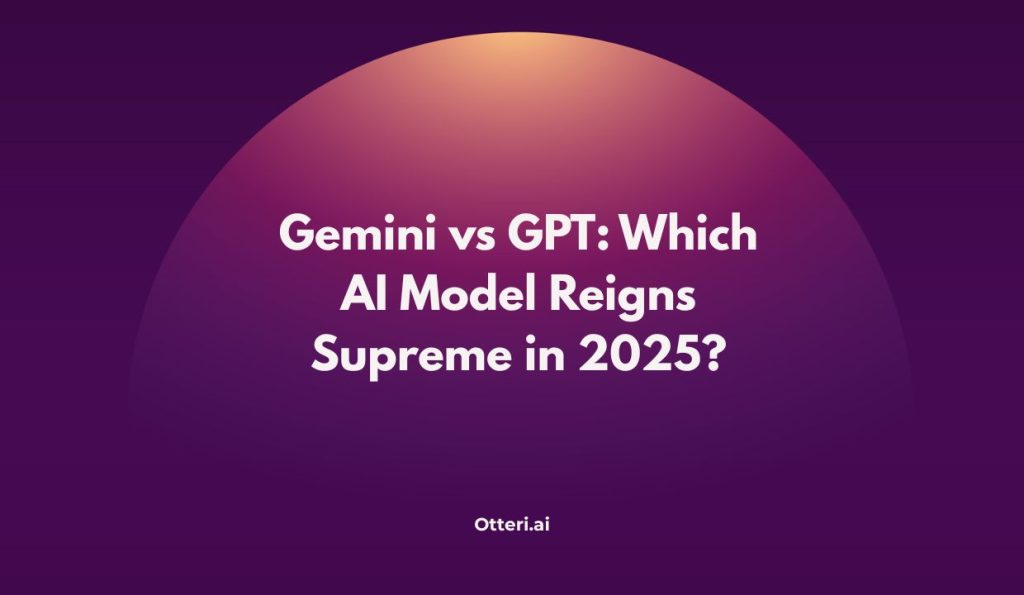
The world of AI has seen explosive growth, and two names dominate the conversation today: Google’s Gemini and OpenAI’s GPT. These aren’t just tech buzzwords — they represent some of the most advanced large language models (LLMs) available today. From powering chatbots and writing tools to coding assistants and research engines, these AI models are transforming industries.
But how do they compare? In this post, we’ll dive deep into a head-to-head comparison of Gemini vs GPT, covering everything from performance and capabilities to use cases, integrations, and pricing. Whether you’re a developer, marketer, content creator, or just curious about AI, this guide will help you choose the best tool for your needs.
Background & Origins
Gemini: Born from Bard, Backed by Google
Gemini is Google’s flagship large language model, developed by Google DeepMind. It evolved from Google Bard, Google’s original conversational AI assistant, but has since grown into a more powerful, multimodal system. With access to Google’s vast data resources and deep integration into products like Search, Chrome, Gmail, and Docs, Gemini is positioned as a formidable contender in the AI space.
GPT: The Evolution of Intelligence
On the other side, we have GPT (Generative Pre-trained Transformer) by OpenAI. GPT-4, and its latest evolution, GPT-4o, powers tools like ChatGPT, which is widely recognized for its advanced natural language understanding, reasoning ability, and versatility across various domains. OpenAI has also partnered with Microsoft, integrating GPT into tools like Copilot in Word and Excel, giving GPT even broader reach.
Performance & Capabilities
Language Understanding
Both Gemini and GPT excel at understanding and generating human-like language. Gemini offers excellent multilingual support, making it a great choice for users across the globe. GPT-4o, however, stands out for its deep contextual understanding — it remembers complex threads of conversation, follows nuanced prompts, and responds intelligently even to abstract questions.
Creativity & Content Generation
It crafts fluid, engaging, and creative text that often sounds indistinguishable from something a human would write. Gemini performs well, too, but tends to be more mechanical and less flexible with tone and style.
Real-Time Knowledge & Updates
This is one area where Gemini takes the lead. Since it integrates directly with Google Search, it can pull in the latest information, making it highly valuable for research, trending topics, and real-time content. GPT-4o, while extremely knowledgeable, relies on pre-trained data (cutoff around 2024) unless web browsing is enabled via premium settings.
Accuracy & Reliability
GPT-4o tends to be more consistent and reliable, especially with complex tasks, fact-based queries, and logical reasoning. Gemini, though powerful, can sometimes provide vague or slightly inaccurate responses, especially in technical subjects or long-form discussions.
Coding & Technical Tasks
Both models are capable coders, but GPT-4o is ahead, particularly when it comes to handling complex code generation, debugging, and multi-language support. It’s a go-to choice for developers working on real-world applications. Gemini also does a good job, especially within Google’s developer ecosystem, but may not yet match GPT’s depth in technical reasoning.
Use Cases: Where Each AI Shines
Let’s explore some of the most common use cases and which model performs better in each:
Content Creation & Blogging
Winner: GPT
GPT is ideal for writers, marketers, and bloggers. It generates long-form content, social media posts, and email copy that’s polished, coherent, and engaging.
Customer Support Automation
Winner: GPT
With a broad range of API integrations and plugin support, GPT excels at building chatbots, customer service flows, and automated responders.
Research & Summarization
Winner: Gemini
With live search data and access to Google’s Knowledge Graph, Gemini is better suited for real-time research, news summarization, and fact-checking.
Coding & Software Development
Winner: GPT
GPT-4o supports multiple languages, offers intelligent error handling, and can debug complex scripts — making it an essential tool for developers.
Education & Learning
Draw
Both models are excellent at tutoring and personalized education. GPT has better explanation depth, while Gemini provides up-to-date references.
Accessibility & User Experience
ChatGPT (GPT Access)
Accessible at ChatGPT
Free tier includes GPT-3.5
Paid tier ($20/month as of 2025) unlocks GPT-4 and GPT-4o
Mobile apps are available for iOS and Android
Integrates with Microsoft tools (Copilot in Word, Excel)
Gemini Access
Available via Gemini
Free and paid plans (part of Google One AI Premium)
Native integration into Google products: Gmail, Docs, Sheets
Available on Android phones (Gemini replaces Google Assistant in some models)
Integration & Ecosystem
GPT Ecosystem
OpenAI’s GPT models are available via robust APIs and can be integrated with hundreds of tools, platforms, and CRMs. With Microsoft’s backing, GPT is embedded into enterprise tools like Azure, Teams, and Office 365, making it highly scalable for business use.
Gemini Ecosystem
Gemini thrives within Google’s ecosystem. It works seamlessly inside Google Workspace apps, enhances mobile experiences on Android, and integrates with Google Search. For users already relying on Google tools, Gemini fits naturally into their workflow.
Final Verdict: Gemini or GPT in 2025?
Both Gemini and GPT are incredibly capable, and the right choice depends on your specific needs.
Choose GPT (especially GPT-4o) if you need creative writing, coding help, logical problem-solving, or integration with business apps and APIs.
Choose Gemini if your work revolves around Google Workspace, requires real-time data, or you’re looking for native multilingual capabilities.
As of 2025, GPT-4o holds the crown when it comes to overall performance, flexibility, and reliability. However, Gemini is rapidly evolving, especially with its real-time capabilities and seamless Google integration. The race is far from over, and for users, the competition only means more powerful, accessible AI tools in the future.